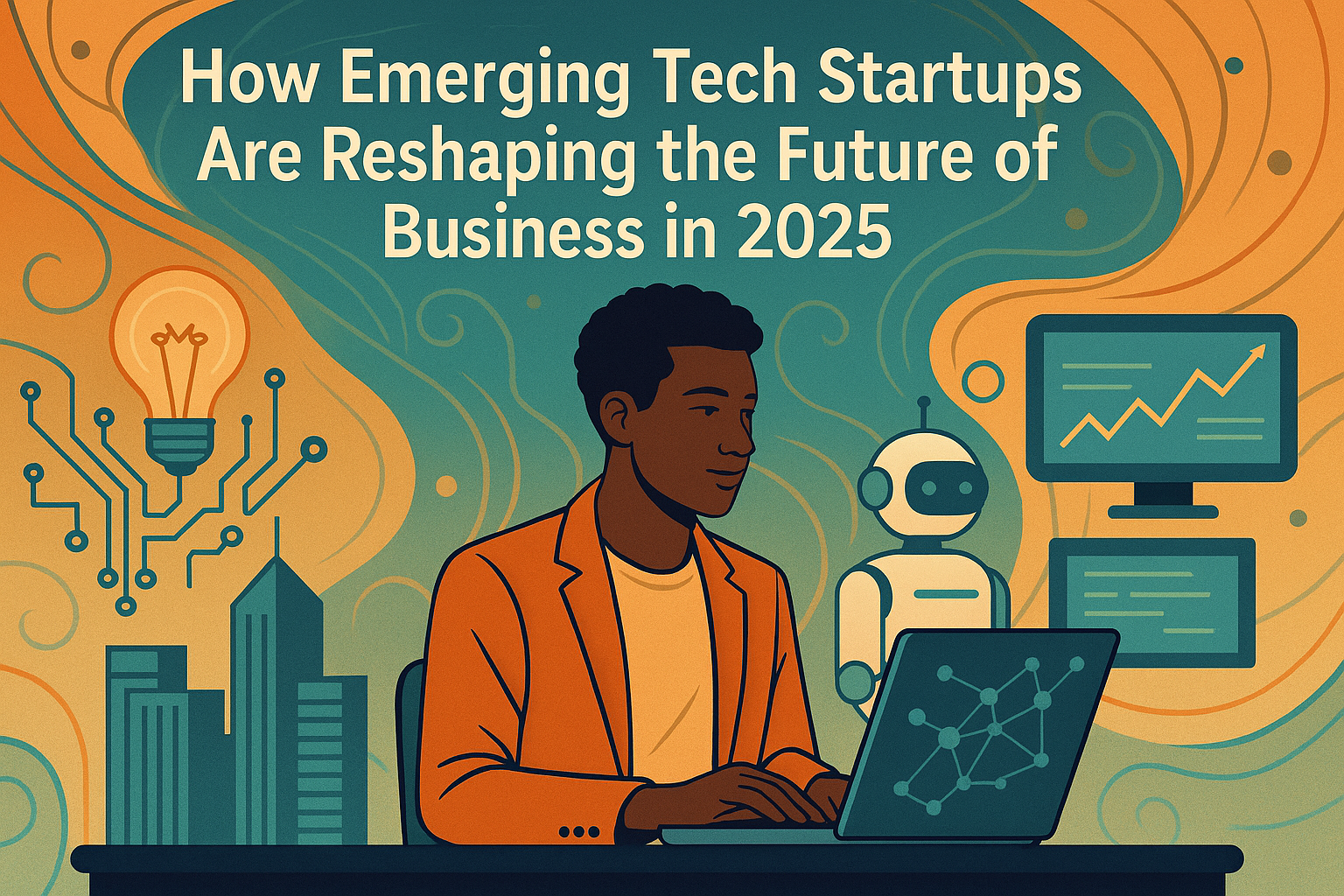Emerging Tech Startups Are Reshaping the Future of Business
Introduction
As we move into the latter part of the decade, 2025 emerges as a pivotal year for businesses worldwide. The growth of new technology startups has shifted from being a passing phenomenon to a cornerstone of contemporary business. These dynamic and innovative firms are changing the game across various sectors, including healthcare, education, finance, and manufacturing. By harnessing advanced technologies like artificial intelligence (AI), blockchain, the Internet of Things (IoT), and cloud computing, these startups are not just entering the marketplace; they are redefining the business landscape for 2025.
This article delves into how tech startups are crucial in altering business standards, fostering economic development, and generating opportunities through innovations and technologies that support business expansion.
1. The Growth of New Tech Startups
In the past ten years, tech startups have seen an extraordinary upswing worldwide. Different from traditional enterprises, these startups are streamlined, flexible, and focused on the future. They place a premium on innovation over the status quo and prefer disruption to complacency. By 2025, examples of this shift include:
– AI-focused startups tackling real issues in health, logistics, and security.
– Blockchain solutions reinventing supply chain management and verifying digital identities.
– EdTech and FinTech innovations reaching markets that have been overlooked.
– Green technology firms fighting against sustainability and climate change issues.
This shift in entrepreneurship signals a broader transition toward a digital-centric, data-informed, and decentralized startup ecosystem by 2025.
2. Trends in Startup Innovation Inspiring Change
Several prominent innovation trends among startups are influencing 2025, such as:
a. Artificial Intelligence and Automation
AI drives intelligent analytics, forecasting models, and self-operating systems. Many startups leverage AI to enhance customer support, streamline processes, and customize user experiences. For instance, AI chatbots now manage about 80% of inquiries in software-as-a-service (SaaS) companies.
b. Blockchain Technology
Blockchain’s application has expanded beyond cryptocurrencies. Startups are adopting it to create secure and transparent platforms for transactions, contract management, and even electoral systems.
c. Tools for Remote Collaboration
The transition to remote work, solidified by the COVID-19 pandemic, is now permanent for several sectors. Startups that provide solutions for digital workspaces, time management, and virtual teamwork have become essential for transforming businesses through AI and cloud technologies.
d. HealthTech and BioTech
New startups are introducing AI-driven diagnostic tools, remote health monitoring systems, and telemedicine platforms that enhance healthcare accessibility and affordability.
3. Leveraging Technology for Business Advancement: A Competitive Edge
Firms that adopt technology find themselves at a competitive advantage. Here’s how technology is driving business growth and opening new doors:
Data-Driven Decisions: Startups utilize big data analysis to gain insights into customer preferences, predict market trends, and mitigate risks.
Scalability: Startups can expand or contract with ease using cloud services like AWS and Azure, minimizing infrastructure expenses.
Cost Savings: By automating processes, businesses cut down on labor expenses while boosting productivity.
This shift has leveled the playing field, allowing even small tech firms to compete on a global scale.
4. Notable Examples of Startup Innovation
a. OpenAI (USA)
Originally a startup, OpenAI has set new standards for the responsible use of artificial intelligence. Today, it serves as a model for many smaller AI companies developing safe and adaptable AI tools.
b. Nuro (USA)
Nuro is changing the landscape of last-mile deliveries with its self-driving vehicles. This breakthrough has the potential to transform logistics for smaller enterprises.
c. Paystack (Nigeria)
This financial technology startup revolutionized online payment systems in Africa and attracted Stripe’s acquisition. It exemplifies the significance of local innovation with a worldwide influence.
d. Climeworks (Switzerland)
This green technology startup captures carbon from the atmosphere, illustrating how emerging companies contribute to environmental sustainability.
5. Challenges Facing Emerging Tech Startups in 2025
Though promising, startups face several obstacles:
Funding Access: Many startups find it challenging to secure venture capital, particularly in developing regions.
Regulatory Challenges: The swift pace of technological advancement often surpasses current laws.
Cybersecurity Risks: With the growth of digital platforms comes increased vulnerability to threats.
Talent Demand: The need for AI specialists, blockchain developers, and data scientists greatly outstrips the available workforce.
Nevertheless, the spirit of entrepreneurship and innovation continues to thrive.
6. Investment Avenues in the Startup Ecosystem
For investors, 2025 presents numerous opportunities in sectors such as
AI and Machine Learning: ranging from content generation to fraud prevention.
Climate Technologies: Startups providing energy-efficient solutions and carbon footprint monitoring.
Healthcare Innovations: Services like telehealth, wearable devices, and genetic testing solutions.
Educational Technology: Customized learning platforms and online tutoring options.
Angel investors and venture capitalists are making significant investments in the business landscape of 2025, particularly in emerging markets.
7. Governments and Ecosystems that Foster Growth
Nations similar as India, Singapore, Estonia, and the UAE have created surroundings that are drinking to startups. They offer
duty breaks
Backing openings and incubators for new businesses
Regulatory fabrics that allow for invention testing
Visas aimed at attracting transnational gift
This cooperation between the public and private sectors boosts the incipiency terrain for 2025 and leads to long– continuing profitable earnings.
8. unborn Perspective What Lies Ahead?
Looking towards the future, it’s apparent that the distinction between tech companies and traditional businesses is fading. By 2025
All companies will serve as tech enterprises.
Innovation will come essential rather than an option.
hookups between large companies and startups will grow more robust.
The business geography in 2025 involves not only using new technologies but also fostering an station that welcomes ongoing change, trial, and perseverance.
Conclusion
To add up, new tech startups have moved from the sidelines to the van of the business scene. By incorporating technology into their growth strategies, driving invention in startups, and opening fresh investment avenues, these businesses are changing the rules of the assiduity.
For entrepreneurs, investors, policymakers, or commercial leaders, the communication is straightforward share in this swell of invention or threat falling before. The future of business in 2025 is unfolding now, shaped by visionaries, inventors, disruptors, and achievers.















Post Comment